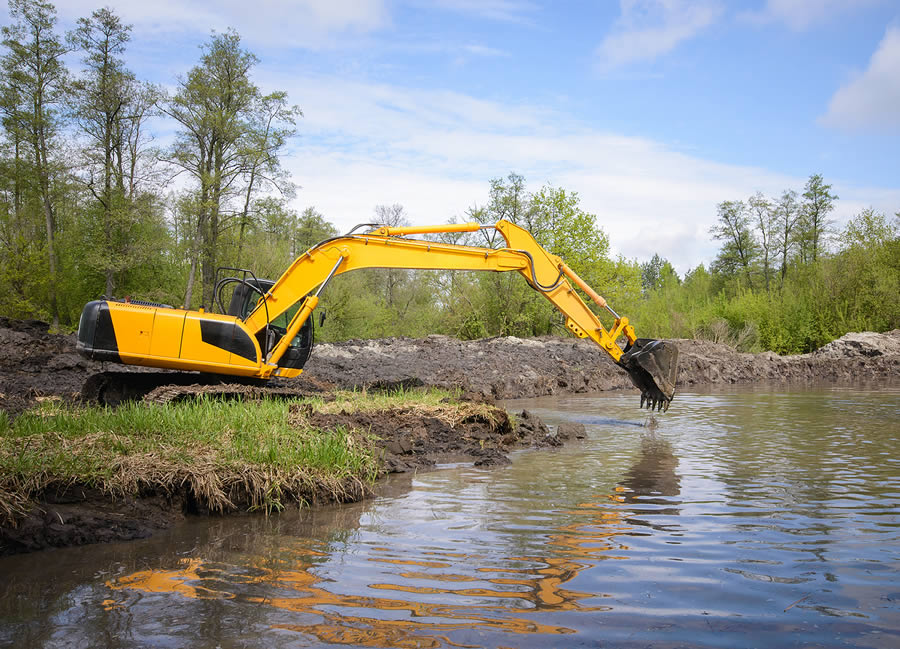
As urbanization continues to shape the landscape of cities and municipalities across the U.S., the challenges of managing stormwater and overflow have become increasingly apparent. Local governments and agencies are tasked with finding innovative solutions that address these issues and promote sustainability and environmental conservation. As a professional lake management company, Aquatic Restoration recommends retention and detention ponds as vital components of stormwater management systems. Although both types of ponds share the common goal of managing stormwater, their mechanisms and purposes differ, each playing a unique role in safeguarding communities and their natural surroundings.
Retention ponds, or “wet ponds,” are carefully designed to mimic wetland natural processes. The primary goal is to hold stormwater runoff and gradually release it with time, allowing for water’s natural filtration and purification. These ponds function as miniature ecosystems, fostering the growth of aquatic plants and providing habitats for various wildlife species.
One of the critical distinctions of retention ponds is their ability to mitigate pollution and maintain water quality. As stormwater accumulates, pollutants settle at the bottom while plants and microorganisms work to break down harmful substances. This process reduces pollutants in local rivers, streams, and groundwater. However, routine retention pond maintenance is essential to ensure everything is in tip-top shape year-long.
Detention ponds are engineered to focus on flood control and managing stormwater flow primarily. These structures temporarily hold excess rainwater, preventing overwhelming surges in water levels during heavy rainfall. Unlike retention ponds, which maintain a consistent water level, detention ponds have a controlled outlet that gradually releases stored water after a storm event has subsided.
The primary function of detention ponds is to ease the burden on local drainage systems and reduce the risk of flooding in urban areas. By controlling stormwater discharge into the drainage system, these ponds help prevent erosion, property damage, and potential threats to public safety. Like the latter, routine checks by a trusted lake management company help to ensure seamless operation and performance.
While retention and detention ponds have distinct purposes, they contribute to sustainable stormwater management’s broader goal. Retention ponds offer ecological benefits, enhancing biodiversity and improving water quality, ultimately benefiting the local ecosystem. Detention ponds prioritize infrastructure resilience, safeguarding urban areas against flooding.
Many stormwater management systems incorporate both types of ponds to balance between environmental preservation and urban development. By combining the features of retention and detention ponds, communities can reap the advantages of reduced flood risk while promoting healthier waterways and habitats.
As cities and small municipalities continue to grow and expand, the importance of effective stormwater management cannot be overstated. Retention ponds and detention ponds are two distinct yet complementary strategies that play vital roles in this endeavor. By combining these strategies, communities can create resilient stormwater management systems that harmonize with nature while meeting the demands of urbanization. Contact us at Aquatic Restoration and schedule a consultation with our experts to access quality retention pond maintenance services.
Lake and pond dredging is an essential maintenance task that helps to improve water quality, restore depth and capacity,…
There’s a lot that goes into managing a lake. Beyond the aesthetics, it’s important to maintain ecological balance and…
Excessive algal growth is a serious threat to lakes and ponds. Left unchecked, algal blooms can deplete oxygen levels and…
Dredging is the removal of accumulated sediment and debris from the bottom of a lake or pond. This process is…
Pond and lake owners deal with a wide range of issues, including algae blooms, aquatic weed infestations, poor water clarity,…